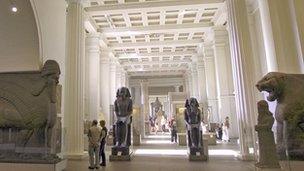BP pledges £10m art sponsorship
- Published

Oil giant BP says it will continue to sponsor the British Museum, the National Portrait Gallery, the Royal Opera House and Tate Britain, pledging £10m over the next five years.
The company announced the "renewal and expansion" of its support for the institutions at a British Museum event.
The announcement follows controversy over BP's backing for the Tate after the Gulf of Mexico oil spill in 2010.
Last year molasses were poured during demonstrations outside Tate Britain.
Earlier this month an 8,000-strong petition was handed to the Tate calling for an end to the sponsorship.
Culture Minister Ed Vaizey welcomed the "significant investment", saying BP had "led the way in business support for the arts".
Tate director Sir Nicholas Serota said the Tate had been "thinking very hard" about the sponsorship issue.
The Tate's ethics committee, he said, had looked at the question in 2010 and 2011, partly in response to letters from individuals and groups.
"The board... thought it was the right thing to continue with BP," he said. "BP have been great supporters of the arts in this country.
"The fact that they had one major incident in 2010 does not mean we should not be taking support from them."
Eleven people were killed in the Deepwater Horizon incident, with four million barrels of oil spilled into the Gulf of Mexico.
Royal Opera House chief executive Tony Hall said the BP issue had been discussed "very carefully".
"BP have been supporters of the ROH for nearly 25 years and we share an aim of getting what we do out to as many people as we can."
National Portrait Gallery director Sandy Nairne said there were protests "every year" over its BP Portrait Award.
"We absolutely respect the right of those who wish to make peaceful protests. We will always think about any sponsorship very carefully."
But he said that there was nothing but "unanimous clarity" within the board of trustees about continuing with BP's support.
"Yes, there will be opinions about oil companies as there are about many other companies," he added, "but that doesn't take anything away from the great work that BP are doing in culture and the arts."
BP managing director Iain Conn said: "We recognise the controversy of what BP does as a company, but we are very proud of the fact that we bring energy to the world and the world runs on energy.
"We need to do it in the right way, but I make no excuses for the fact that we are at the forefront of providing energy to the world in the 21st Century."
British Museum director Neil MacGregor said that, thanks to BP's support, "well over 1 million visitors to the British Museum have been able to get close to Michelangelo, discover the ancient Egyptian Book of the Dead, experience Chinese New Year and understand Ancient Persia".
Following BP's announcement, pressure group Platform told the BBC News website that its involvement with the institutions "represents a serious stain on the UK's cultural patrimony".
The group organised a letter sent to the Guardian last year, signed by 171 artists, complaining about BP's support for Tate Britain.
Sam Chase, of protest group Art Not Oil, said BP was profiting from a product that "is destabilising the climate which is making life on earth increasingly difficult for many millions of human beings and other species".
"Something fundamentally important is lost when you put a corporate logo on a piece of art," he added.
The issue of corporate investment in the arts has proved a divisive one over the past 12 months.
Earlier this month, poets John Kinsella and Alice Oswald withdrew from the shortlist of the TS Eliot Prize in protest at its sponsorship by investment firm Aurum Funds.
- Published8 December 2011
- Published24 September 2010